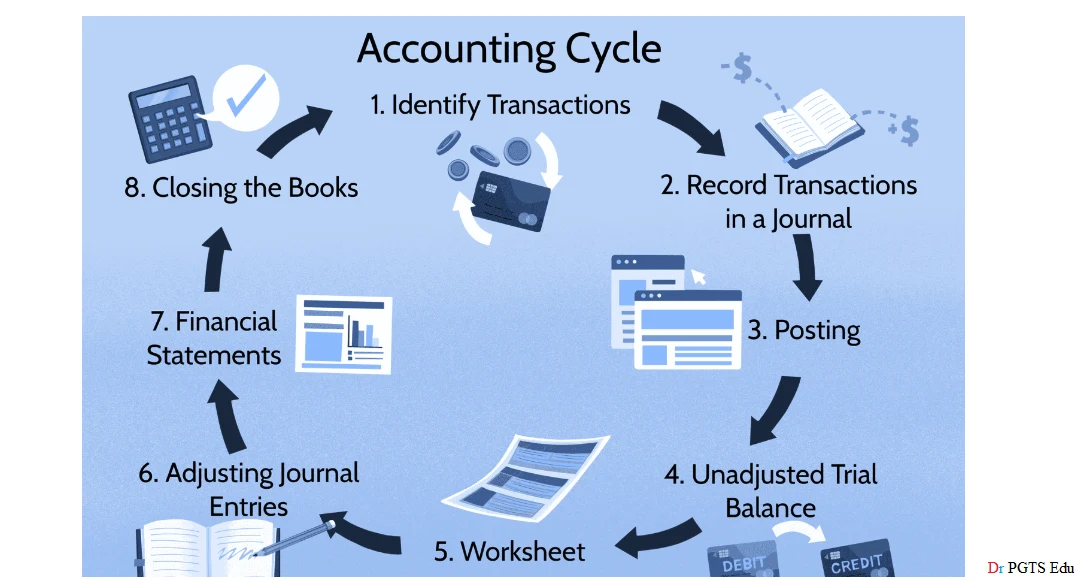Financial accounting is the backbone of any business, ensuring accurate financial reporting, compliance, and strategic decision-making. As we move into 2025, businesses must adapt to emerging trends, regulatory changes, and technological advancements. This article explores the key aspects of financial accounting, including definitions, features, concepts, golden rules, functions, types, branches, merits, demerits, and the latest accounting trends in India.
Definition of Financial Accounting
Financial accounting is a specialized branch of accounting that records, summarizes, and reports financial transactions of a business. It provides financial statements such as the balance sheet, income statement, and cash flow statement to external stakeholders, including investors, creditors, and regulatory authorities.
Features of Financial Accounting
- Systematic Recording – Transactions are recorded systematically to ensure accuracy and consistency.
- Financial Statements – The preparation of financial reports provides a clear picture of the company’s financial health.
- Historical Data – Financial accounting relies on past data to evaluate performance.
- Regulatory Compliance – It ensures businesses adhere to legal and accounting standards.
- Objective and Reliable – Financial records should be free from bias and based on factual data.
Concepts and Conventions of Financial Accounting
Accounting Concepts:
- Business Entity Concept – A business is separate from its owner.
- Going Concern Concept – Assumes that a business will continue its operations indefinitely.
- Accrual Concept – Revenues and expenses are recorded when they occur, not when cash is exchanged.
- Consistency Concept – Accounting methods should remain consistent over time.
- Materiality Concept – Significant financial information must be disclosed.
Accounting Conventions:
- Conservatism – Accountants should recognize potential losses but not anticipated gains.
- Full Disclosure – Financial reports must include all relevant information.
- Cost Convention – Assets should be recorded at their original cost.
- Matching Principle – Expenses must be recorded in the same period as the related revenue.
Golden Rules of Accounting
- Personal Accounts – Debit the receiver, credit the giver.
- Real Accounts – Debit what comes in, credit what goes out.
- Nominal Accounts – Debit all expenses and losses, credit all incomes and gains.
Functions of Financial Accounting

- Recording Transactions – Keeping a systematic record of all financial activities.
- Classification – Categorizing transactions into different accounts.
- Summarization – Preparing financial statements and reports.
- Analysis and Interpretation – Evaluating financial performance.
- Communication – Sharing financial information with stakeholders.
Types of Financial Accounting
- Cash Accounting – Records transactions when cash is received or paid.
- Accrual Accounting – Records transactions when they occur, regardless of cash flow.
- Tax Accounting – Focuses on tax compliance and regulations.
- Cost Accounting – Analyzes costs to control expenses and improve profitability.
- Management Accounting – Provides financial insights for internal decision-making.
Branches of Financial Accounting
- Financial Reporting – Preparing financial statements for external use.
- Auditing – Examining financial records for accuracy and compliance.
- Forensic Accounting – Investigating fraud and financial irregularities.
- Tax Accounting – Ensuring compliance with tax laws and regulations.
- Corporate Accounting – Managing company finances, including investments and mergers.
Merits of Financial Accounting
- Ensures Financial Transparency – Provides a clear view of a business’s financial position.
- Aids Decision Making – Helps management make informed financial choices.
- Regulatory Compliance – Ensures adherence to tax laws and financial regulations.
- Attracts Investors – Well-maintained accounts build investor confidence.
- Prevents Fraud – Reduces the risk of financial mismanagement.
Demerits of Financial Accounting
- Historical in Nature – Focuses on past transactions rather than future forecasts.
- Does Not Consider Inflation – Assets are recorded at cost price, not adjusted for inflation.
- Limited Scope – Financial accounting does not include non-financial factors like employee satisfaction.
- Complex Regulations – Businesses must comply with evolving accounting standards.
Recent Accounting Trends in India (2025)
- Adoption of AI and Automation – Businesses are integrating AI-powered accounting software for accuracy and efficiency.
- Cloud-Based Accounting – Remote access to financial records is increasing with cloud technology.
- Blockchain in Accounting – Ensures transparency and security in financial transactions.
- Rise of ESG Accounting – Environmental, Social, and Governance (ESG) factors are gaining importance in financial reporting.
- Regulatory Changes – The Indian government is implementing stricter compliance measures for tax filing and auditing.
- GST Updates – Revisions in Goods and Services Tax (GST) laws impact financial accounting practices.
Financial accounting continues to evolve with new technologies, regulatory frameworks, and industry demands. Businesses must stay updated with the latest trends, including automation, blockchain, and ESG reporting, to maintain compliance and financial efficiency in 2025. By understanding financial accounting principles, businesses can improve transparency, attract investments, and ensure long-term success.
Read also: Principles of Accountancy the ultimate guide for beginners

